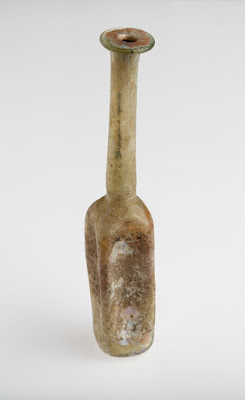And he washeth one over a Bason, 5. with Suds running out of a Laver, 6. and also with Sope, 7. and wipeth him with a Towel, 8. combeth him with a Comb, 9. and curleth him with a Crisping Iron, 10. │ Et lavat super Pelvim, 5. Lixivio defluente è Gulturnio*, 6. ut & Sapone, 7 & tergit Linteo, 8. pectit Pectine, 9. Crispat Calamistro, 10.
*possible
misspelling of a very rare word: gutturnium, -ī
[2/n]: jug or pitcher with a narrow neck; the Romans used a gut(t)us,
-ī [2/m], a small narrow-necked flask from which drops of oil were poured,
from gutta, -ae [1/f]: drop (of fluid)
image #1: Roman
glass guttus from Cologne
pecten, pectinis
[3/m]: comb
pectō, -ere, pēxī
[3]: to comb
image #2: double-sided
ivory comb [(?)3rd-4th century AD; British Museum] with
its mysterious Latin inscription: MODESTINA¦VHEE
MODESTINA is the
owner’s name; VHEE has two interpretations:
[i] a mis-spelling
of VALE; while that is possible – there are other examples of misspellings
including on gravestones – the idea of bidding “farewell” to Modestina, the
comb being some sort of funerary offering, is unlikely; I also think it’s unlikely
because of the letter shapes of the A in MODESTINA and that of the H; whoever
carved it seemed to know the difference
[ii] a four letter
abbrevation i.e. V(XOR) H(ONESTA) E(T) E(XCELLENS): honourable and oustanding wife;
abbreviations are common in inscriptions
and so maybe that is the “answer” – but nobody knows for sure


No comments:
Post a Comment